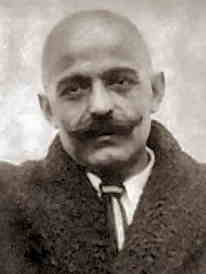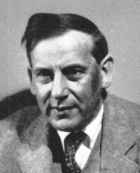SelfDefinition.Org
Gurdjieff Quotes

Aphorisms by Alfred R. Orage
Esta página en español: orage-aforismos-espanol.htm

Alfred R. Orage
- A normal man is one who has not only actualized his potentialities but has freed himself from his subjectivity.
- Ordinary man is at the mercy of his organism: of the instinctive center - impressions received by the senses, of appetites, inertia, disease; of the feelings - associations connected with people and places past and present, likes and dislikes, fear and anxiety; of the mind - imagination, day-dreaming, suggestibility.
- Man believes he has will: this is his illusion.
- If man were truly the heir of all the ages he would be on the shoulders of his ancestors.
- Being has to do with the feeling center and depends on knowing and doing. It is the result of the struggle between the affirming and denying parts. "A being is one who feels," and is therefore to be graded by the range and intensity of feeling. Any attempt to attain superior being directly leads to a psychopathic state.
- Beings differ in the potentiality of their awareness.
- The birthright of a human being is the desire for self-consciousness, which should appear at the age of majority. At about the age of thirty there should come a sense of the world in which we live, the dawning of cosmic consciousness. After this, according to one's gifts, conditions, circumstances and so on, one should become a conscious agent in the functions of the cosmos, which is a total scheme of which we would have a relative comprehension.
- The emotional center is the dynamo of our whole life. In it are our wishes, which maintain us and our bodies in life. Wishes are on different planes. The highest wish, once felt, never can be displaced.
- Neurotic symptoms are due to the three centers being out of step with each other, out of harmony - one center being in a definitely different tempo and intensity from the others.
- Objective Reason is that which is immortal. The effort I make to become objective transforms substances which thereby become permanent, immortal. I acquire a permanent "I" which is independent of the vicissitudes of life, aware of a conscious purpose, which persists through ups and downs, through runs of good and bad luck.
- Pondering is answering questions from essence and answering them practically. One third of one's time should be spent in pondering. Pondering is intellectual assimilation. Pondering implies the use of both mind and emotion.
- The world of ideas is populated as is the world of nature. The ability to treat ideas as if they were things, to distinguish between them, would be objective thought.
- No Statement can be understood without the effort of conscious assimilation: this brings realization.
- Controlled imagination becomes mental work. Introspection is a form of lunacy.
- Reasoning is the locomotion of the thinking center, which is composed of definite organs - concentration, pondering, meditation, contemplation. Logical progression is the ordinary locomotion of the thinking center as a whole.
- Life in the planetary body is Sensation; in the astral body, emotion; in the mental body, thought.
- The reason of ordinary man is the reason of knowledge. The reason of normal man is the reason of understanding. Knowledge is temporary, can be changed. Understanding is permanent - unchangeable.
- If we can say with the same simplicity "I have a body" as we say "I have a car" we can begin to realize that this body is a transforming machine which "I" can have. "I" have a machine to use, does not mean "I" am a machine. "I" have a body, a mechanical organism whose function it is to transform substances and energies.
- Consciousness is an electrical phenomenon which arises from a state of being which we can feel.
- Unless we can "remember" ourselves, we are completely mechanical. Self-observation is possible only through self-remembering. These are the first steps in self-consciousness.
- Conscious Faith, Hope and Love are the growing ends of essence. Faith is confidence, not mere belief. Hope is effort, not wish; effort to make it so; not a wish that it may be so.
- Belief is a luxury – only those who have real knowledge have a right to believe; otherwise belief is merely plausible opinion.
- Voluntary Conscious Labor: that which is made against the inertia and mechanism of the organism; not for personal gain or profit, exercise, health, sport, pleasure, or science; not out of pique, or like or dislike.
- With Conscious Work, individuality takes the place of personality. Individuality grows from essence.
- You can learn to know when you are making effort consciously by your experience of making effort physically, by overcoming inner inertia - pushing against the collar.
- Time is the most important thing next to awareness. The flow of time through us gives us an opportunity to extract what we can. Time is the three-fold stream flowing through our three centers. We fish in time's 'ever-rolling' stream; what we catch is ours, but what we don't is gone. Time does not wait for us to catch everything in the stream, but if we catch enough we shall have enough to form the higher bodies - and thereby become enduring.
- Time is the sum of our potential experiences, the totality of our possible experiences. We live our experiences successively; this is the first dimension of time. To be able to live experiences simultaneously is adding another or second dimension to Time. To be aware of this simultaneity is called solid Time, or the third dimension of Time.
- Ordinary knowledge is awareness of external facts; ordinary belief, conviction on inadequate grounds. Objective Science is that which has as its conscious purpose the investigating of the meaning and aim of existence.
- The observation of others is colored by our inability to observe ourselves impartially. We can never be impartial about anything until we can be impartial about our own organism.
- We are primarily concerned with ourselves, as judging agents; and the proper study of every individual is himself or herself. Only he who has attempted to judge himself can have an idea of judging anyone else. An aphorism in the Study House at the Prieure says: "Judge others by yourself and you will rarely be mistaken."
- There is no such thing as an immortal work of art. There is one art - the greatest of all, the art of making a complete human being of oneself.
- Essence is a chemical deposit from the sun and planets of the solar system, which enters earth-beings at the moment of conception. In man this affects the region of the solar plexus. It is unlike any of the chemicals found on this planet, and links man to the cosmos. As the chemicals of the physical body return to this planet after death so do the chemicals of essence return to their sources.
- Will: only that which is self-initiated, not obliged, not wanted by the organism. An effort to accomplish an "I" wish, not "it" wishes.
- Redemption is the ultimate actualization of potentialities – to "be what we must be."
- Commonsense mellowed and experienced is wisdom; and wisdom in its ripeness is beauty.
- Humor: a form of intuition.
- Intuition with certainty is judgment.
- Egoism: measuring others by our likes and dislikes – not by their needs but by our preferences.
- Vanity: that something for which we will sacrifice almost anything rather that that it should be hurt.
- Sentimentality: a slight emotion exaggerated by muddled thinking. "Do noble deeds, and regret them all day long."
- The happy person is he who is striving to actualize his potentialities.
- There is little difference in the experiences of different people - the difference consists in what they do with them. The importance of our first food is not so much in the quantity and quality as in the digesting of it. Experiences are another form of food; from this point of view it does not matter much what happens as how we take experiences.
- Life should be a voluntary overcoming of difficulties, those met with and those voluntarily created, otherwise it is just a dice-game.
- The realization of ignorance is the beginning of wisdom.
—Alfred R. Orage
[ end ]
en.wikipedia.org/wiki/